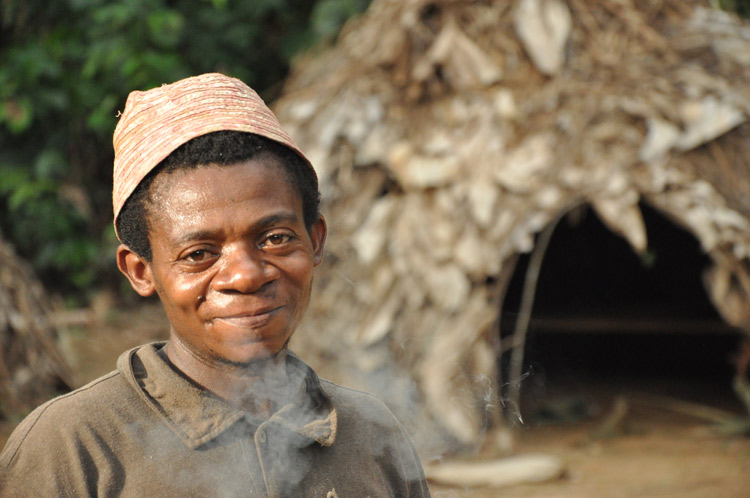In spring 2019 an ICRA mission visited the Baka and Bakola-Bagyéli communities in the rainforest of south Cameroon in order to provide a description of the present situation of these forest communities in the face of deforestation and other threats. We were glad to notice that, despite the profound changes made to their environment, these communities have exhibited a remarkable resistance, by adopting multiple adaptive strategies and by constantly maintaining a strong link with the forest — their eden and their haven.
The mission took place in March of this year. Its purpose was to visit theBaka and Bakola-Bagyéli communities in the rainforest of south Cameroon in order to provide a description of the present situation of these forest communities in the face of deforestation, palm oil and rubber tree plantations, and the presence of a pipeline from neighbouring Tchad crossing their land on its way to Kribi, on the west coast of Cameroon.
For the Baka the forest is everything.
The Baka live in the forests of eastern and south-eastern Cameroon. More often than not, the roads are mere dirt tracks, although some parts are being widened and should soon be upgraded to bitumen standard. Most concessions were allocated to Chinese firms, in exchange, it seems, for timber concessions. While it is true that deforestation in the Congo basin is not on the same scale as in south-east Asia or, worse, in the Amazon basin, it has been on the increase in the past few years. The many logging trucks we met in the three weeks we were there seem to be a clear sign. The Baka forest, however, is still relatively intact, with many high trees such as moabis towering over the dense canopy.
The Baka live in small temporary villages or encampments some distance from the dirt track. The larger villages, such as Assoumindélé, contain a great many permanent houses made of poto poto, a framework of hard wood and bamboo covered with earth. The mongoulou, the traditional Baka huts made of branches and leaves, are never far off.
During the hunting period, which is usually the rainy season, the villages are empty. For several weeks, if not months, families roam through the forest, hunting for game and eating the mushrooms and other foodstuff at their disposal in this bounteous environment.
When the dry season comes, game becomes scarce and more difficult to track. Then the communities return to the villages and practice slash agriculture where they grow cassava, plantain, maize, etc. But the forest is never far. The women frequently return there to practice weir fishing along the rivers. The men, too, return whenever an opportunity arises, such as our visit and our wish to discover this dense, attractive forest, despite the high humidity, thehard hiking conditions and the myriad of insects!
These last years, many community forests have been created in Cameroon, some of them in Baka country. Never exceeding 5,000 hectares, these forests are allocated to the communities for a renewable period of 25 years, and with a right of usage, but no rights on the land or minerals. The Baka can therefore live safe lives there, and even exploit some of the trees to sell the timber under very tight conditions dictated by the forestry laws. However, outside those well-defined areas, the Baka remain under the constant threat of agribusiness and mining projects. Not far from Mintoom, a Chinese multinational company, Sud-hévéa, has started the exploitation of rubber trees on a large scale on Baka land.
There was of course no FPIC, free prior informed consent, given by the people affected, although it is a compulsory move in any development program on indigenous land.
Mbkolo, one of the Kobo (chiefs) of Assok, a Baka village, is perfectly aware of these fast-approaching dangers. If the forest dies, the Baka will disappear, too, because we cannot live without it. It feeds us, it protects us, it heals us, it is at the heart of our beliefs. The forest is like a box. We must preserve everything in that box. The forest is life, our life, your life.
In most Baka villages and encampments ancestral rites are still being performed, even among the most sedentary communities. The Djenki (forest spirit) ritual is still alive and continues to initiate boys into the adult world and its knowledge of the secrets of the forest, ensuring thus the continuity of Baka society.
What future for the Bakola and Bagyeli?
The second part of our mission took us to the Bakola and Bagyeli communities of south-east Cameroon and the ocean province. The proximity of the ocean and a denser road network have led to a higher rate of deforestation than further east. The Bagyeli encampments in particular are affected by the development of palm oil plantations (especially those belonging to the French group Bolloré), by the route followed by the pipeline, and by the recent opening of a deep water harbor in Kribi to allow the exportation of timber and other raw material to our western over-consuming shores!
As with the Baka, these communities have never been consulted, and the promises of compensation never kept. Stuck between port facilities and industrial plantations, the encampments are still there… but for how long?
The communities are aware of the changes to come. With the help of organizations like Fondaf, for several years now they have developed schools for young children, using the ORA method (observe, reflect, act), which fully respects traditional culture: in the first year, the children are taught in their own language, and only then in Bantu and French. Th teachers all come from the communities.
During our mission, the communities have expressed their needs, particularly in the fields of health, education and diet. Several support programs have been considered, and will be discussed during our ICRA spring general assembly.
Patrick, Ken and Hervé from ICRA International
The forthcoming issue of our Ikewan magazine (in French) will present our mission among the Baka, Bakola and Bagyeli.

